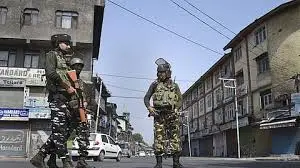Amid push for terror tag for TRF, Indian team meets top UN counter-terror officials

India has launched a strong diplomatic campaign to designate The Resistance Front (TRF) as a global terrorist organization. This push comes after a deadly terror strike in Pahalgam, Jammu and Kashmir, on April 22, 2025. The attack killed 26 civilians, including women and children, making it one of the most brutal in recent memory.
Authorities have linked TRF to Pakistan-based Lashkar-e-Taiba (LeT), a group already banned by the UN. TRF is widely seen as its proxy. India believes that securing a UN terror designation will cripple TRF’s funding and mobility.
The Pahalgam Massacre: Trigger for Global Action
Gunmen ambushed tourist vehicles in the Pahalgam region, targeting unarmed civilians. Victims included families on vacation, adding to the emotional weight of the incident. Security forces neutralized the attackers within hours, but the damage was done.
Investigators found key evidence tying the assault to TRF. Officials recovered encrypted messages, foreign currency, and weapon signatures linked to past LeT strikes.
The scale and brutality of the incident sparked global concern. It also gave India a strong case to raise the issue on international platforms.
High-Level UN Meetings in New York
In mid-May, a senior Indian delegation flew to New York. They met top United Nations counter-terror officials, including Vladimir Voronkov, Under-Secretary-General of the UN Office of Counter-Terrorism, and Natalia Gherman, Executive Director of the UN’s Counter-Terrorism Committee.
India submitted a detailed dossier during these meetings. The evidence outlined TRF’s involvement in the Pahalgam attack, its ties with LeT, and the support it allegedly receives from Pakistan.
The Indian officials didn’t just demand attention—they called for action. They asked the UN Security Council’s 1267 Sanctions Committee to list TRF as a terror outfit. If listed, TRF would face global sanctions, travel bans, and asset freezes.
Solid Evidence Backing India’s Case
The dossier included satellite images, mobile communication intercepts, and financial data. It showed direct links between TRF handlers and locations inside Pakistan. India also shared confessions from captured TRF members who revealed training and funding routes.
Indian representatives stressed that TRF doesn’t operate alone. They said it exists only due to the support of its parent organization, LeT, and shelter from the Pakistani state.
A senior diplomat stated, “We are not asking the UN to take our word for it. We are providing hard proof.”
Challenges from the China-Pakistan Axis
Despite the solid evidence, India’s proposal faces resistance. China, a permanent member of the UN Security Council, has often blocked efforts to list Pakistan-linked terrorists. Reports suggest that China influenced recent UN reports to exclude TRF, even after its role in Pahalgam was exposed.
Instead, the report included mentions of groups like the Balochistan Liberation Army. This shift is seen as a concession to Pakistan’s demands.
India criticized these political games. “Terrorism should not be filtered through strategic alliances,” said one Indian envoy. “Selective listing undermines global counter-terror efforts.”
Operation Sindoor: India’s Local Response
While India pushes at the UN, its security forces have launched “Operation Sindoor” along the Line of Control. This mission targets launchpads, hideouts, and weapon caches used by terror outfits like LeT and TRF.
So far, the army has dismantled several bunkers and arrested key operatives. Airstrikes and ground raids continue in high-risk areas near the border.
Officials said the operation aims to disrupt infiltration routes and prevent future attacks. Military commanders noted that some targets had direct links to the Pahalgam attackers.
Global Terror Requires Global Unity
India has used this moment to call for a modern, united approach to fighting terrorism. At a recent UN event, Indian diplomats highlighted the evolving nature of terrorist threats. They warned about the rise of cyber-terror, digital financing, and deepfake propaganda.
India urged the UN to develop updated counter-terror protocols. These would include tighter monitoring of cryptocurrency flows and better cooperation on tracking online radicalization.
India’s Permanent Representative told the UN, “Terror groups are adapting fast. We must respond even faster, with joint intelligence, unified laws, and shared tech.”
Support from Global Allies
India’s case has received backing from key global powers. The United States, France, and the United Kingdom have expressed concern over TRF’s activities. These nations have often supported India’s earlier proposals to blacklist individuals tied to LeT and Jaish-e-Mohammed.
Observers believe that with broader support, India could build momentum for the TRF listing. However, China’s veto power remains a hurdle.
India hopes that sustained diplomacy, paired with undeniable evidence, will convince even reluctant parties.
Conclusion: A Test for Global Resolve
India’s push to label TRF as a global terror outfit isn’t just about one incident. It reflects years of frustration over cross-border terrorism and selective global action.
If TRF continues to operate with impunity, the credibility of international counter-terror mechanisms could suffer. India’s message is simple: no double standards, no safe havens.
Whether the world acts on that message will reveal its true stance on terrorism.






